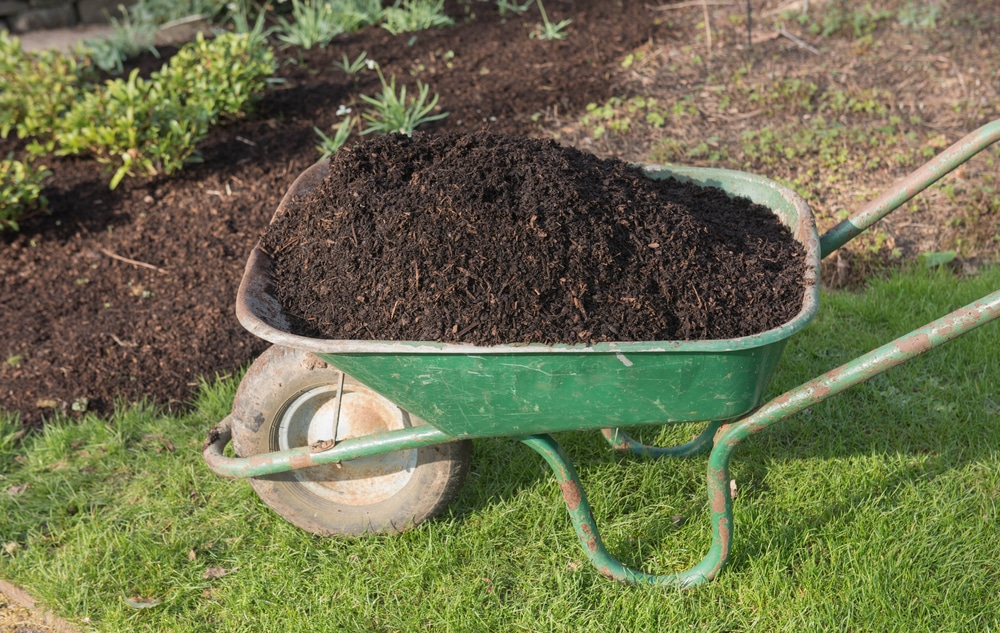Maintaining aesthetics is naturally an important pursuit for your landscape, and mulch is a product that’s regularly used for both aesthetic and practical purposes. A common question down these lines: Does black mulch fade?
At BioGrass Sod Farms, we’re here to offer clients around Salt Lake City a huge range of black mulch, dark brown mulch and other landscape mulch for all their needs, plus numerous other landscaping products like landscape gravel, fertilizer, topsoil and more. Here are some basics on whether black mulch can fade, the factors that can contribute to fading, and how to manage these while maintaining the ideal black color for your mulch.
Does Black Mulch Fade?
Technically speaking, as you may have expected, the answer here is yes – like any product exposed to the elements, black mulch can fade over time. This is especially true if it’s made of organic materials, which are more vulnerable to fading and other weather-related damage than synthetic options.
However, the rate and severity of this fade tend to be low to begin with – and can be mitigated by some of the approaches we’ll go over in just a bit. Most quality black mulch will retain its initial color for at least a few months regardless of exposure, and often for longer periods than this.
Factors That Contribute to Fading
There are several factors that can contribute to fading in black mulch:
- Sun Exposure: The primary culprit here is UV light from the sun, which naturally breaks down organic materials over time. If your mulch is in an area with direct sunlight for extended periods of time, it will fade more quickly.
- Moisture Levels: Both too much and too little moisture can lead to fading. Excessively wet or dry conditions can damage organic mulch and cause it to lose color faster.
- Type of Mulch: As mentioned, synthetic mulches tend to be more resistant to fading than organic options. However, even within the world of organic mulch, some types – like pine bark or cedar – are known for their ability to retain color longer.
- Maintenance and Care: Properly maintaining your mulch can also extend its lifespan and help prevent fading. This includes regularly fluffing the mulch to expose fresh layers, keeping it moist but not overly wet, and avoiding chemical fertilizers that can damage the color of the mulch.
And while some of these causes obviously can’t be completely avoided over time, there are things you can do to mitigate their impact. Read on to learn about these in detail.
Mixing and Turning
Naturally, one example of a black mulch fading cause that you can’t completely avoid is sun exposure – mulch is going to get some sun no matter where you place it. However, one tactic that can be very effective for limiting the extent of this fading is to turn and mix your mulch regularly. Doing so will expose fresh layers of the mulch that haven’t been exposed to the sun yet, helping maintain its color longer.
For instance, if you have mulch that’s directly in the sun for most of the day, consider turning it once a month. This will keep the color more consistent and prevent any one area from becoming significantly faded.
Proper Moisture Levels
We mentioned earlier how moisture levels can impact fading – both too much and too little water can cause this issue. To help prevent overexposure to water, make sure your soil is well-drained before laying down mulch. Additionally, use a layer of landscape fabric underneath the mulch to help regulate moisture levels.
On the flip side, be sure to regularly check on your mulch to ensure it’s not too dry, which can also lead to fading. If you live in a particularly dry climate, consider adding a layer of compost or peat moss on top of the mulch to help retain moisture.
Adding Top Layers
Another option for dealing with fading in black mulch is simply to add more layers on top of older ones. This may not be a long-term solution, but it can help extend the life of your original layer before needing to completely replace it. Additionally, adding top layers can also help maintain the aesthetic appeal of your landscape by covering up any faded spots.
In summary, yes, black mulch can fade over time due to various factors such as sun exposure, moisture levels, type of mulch, and maintenance. However, with proper care and regular maintenance – like turning and mixing regularly, maintaining proper moisture levels, and adding top layers when needed – you can prolong the lifespan of your black mulch and keep it looking vibrant for longer.
At BioGrass Sod Farms, we offer high-quality landscape mulch options that are designed to resist fading and maintain their color for longer. Contact us today to learn more about our products and how we can help you achieve a stunning and long-lasting landscape anywhere around greater SLC.
